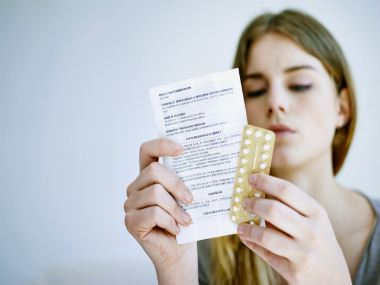Of all the contraception methods available to women across the globe, oral contraceptives are becoming popular because they are easy to use and fertility usually resumes soon after you discontinue them. When on the pill, you are required to take them every day to avoid unwanted pregnancies. They might also be prescribed to manage other health issues like irregular periods, endometriosis, polycystic ovaries syndrome (PCOS), acne, etc. It’s entirely possible for women to miss a dose or two or take it at the wrong time though. Medical professionals have revealed that this lack of patient adherence negatively impacts the effectiveness of the pills. Researchers in the US have now developed a once-a-month oral contraceptive pill that can help. [caption id=“attachment_7764691” align=“alignleft” width=“380”]  Representational image. Image source: Getty Images.[/caption]
Less is more
This new pill needs to be ingested once a month and it will keep slowly releasing hormones until the month-end. The team of researchers, funded by the Bill and Melinda Gates Foundation and based mostly out of the Massachusetts Institute of Technology and the Harvard Medical School, have tested the pill on pigs as of now. The team, led by Dr Ameya R Kirtane, published the findings of their research in the journal Science Translational Medicine earlier this month. They realised that the best way to ensure patient adherence was to reduce the frequency at which the medication needs to be taken. Instead of daily oral contraceptives, a single, once-a-month dose system would be much easier to follow for most patients.
What gastric acids do
However, Kirtane and her team had to grapple with the issue of gastrointestinal acids. These gastric acids in the stomach can easily dissolve most foods and capsules. So, the scientists had to experiment with different formulations of gelatin capsules to ensure a month-long drug release system. Since the gastrointestinal system of pigs matches that of humans the most, they opted to conduct the experiments on these animals. The pill these scientists then designed used poly(dimethylsiloxane)-based polymer matrices for a sustained release of levonorgestrel, a synthetic progesterone used in contraceptives. The pill was star-shaped and easy to swallow. After the test subjects swallowed the pill, the researchers conducted weekly x-rays and mapped how the medication was faring.
Why further research is needed
The results of the study were positive, and the team will soon conduct more research to perfect the sustained-release drug system so that clinical trials on women can be started. The most important challenge they need to overcome is the stabilisation of the polymers that are used to make the drug delivery system, especially in the face of gastric acid action. The researchers also observed that arms of the star-shaped drug were falling off during their trials and then exiting the body via normal excretion. The actual contraceptive efficacy (whether the contraceptives actually work) wasn’t noted during this study. The scientists are hoping to run further tests on dogs to understand the effectiveness of this contraceptive method better. If this sustained-release contraceptive pill is indeed perfected, it will revolutionise sexual health for women all over the world. For more information, please read our article on Contraceptive Pills_. _ Health articles in Firstpost are written by myUpchar.com, India’s first and biggest resource for verified medical information. At myUpchar, researchers and journalists work with doctors to bring you information on all things health.


)

)
)
)
)
)
)
)
)



